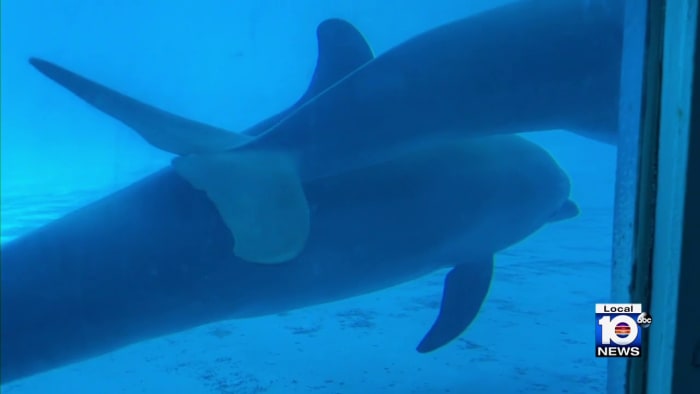
www.local10.com
Dolphins at Miami Seaquarium became more aggressive after ‘abrupt’ diet cuts, federal inspectors find
A July 6 report that the U.S. Department of Agriculture made public on Friday details how inspectors said the Miami Seaquarium drastically cut the diets of nine dolphins to get them to perform better — but instead this resulted in angry dolphins fighting back.
Local
MIAMI – A July 6 report that the U.S. Department of Agriculture made public on Friday details how inspectors said the Miami Seaquarium drastically cut the diets of nine dolphins to get them to perform better — but instead this resulted in angry dolphins showing signs of aggression towards trainers and members of the public.
Jared Goodman, deputy general counsel of the People for the Ethical Treatment of Animals Foundation, said the report confirms what PETA haS been saying for years about the animals’ terrible suffering at Miami Seaquarium.
“This is a clear indication that the Seaquarium is unable to appropriately care for these animals,” Goodman said.
The Dolphin Company purchased the Miami Seaquarium and has been operating it since March.
The USDA report details how the Seaquarium cut some diets from 13 pounds of fish to only three pounds daily. In all, according to the report, there was a 60% cut to the dolphins’ daily food rations, and this resulted in skinny, emaciated dolphins as shown in some images published by PETA last month.
“It’s it is heartbreaking to see that Aries lost 63 pounds that Colbalt lost 104 pounds (in just four months). And to be feeding a dolphin three pounds per day… that happens but only when they are sick,” said Jenna Wallace, a former veterinarian at the Seaquarium.
Dr. Wallace was on staff when the USDA also issued another scathing report in June of 2021- saying the Miami Seaquarium’s previous owners, Palace Entertainment/Parques Reunidos, also dramatically cut diets for animals at the park and even fed rotten fish to Tokitae, the 56-year-old orca that has since been retired from performing.
The new attending vet, Shelby Loos told inspectors that she had no knowledge of diets being cut, but Wallace doesn’t buy it.
“I find it very, very difficult to believe that the veterinarian was not informed that the animals were eating three, four pounds of fish per day,” Wallace said. Even more alarming, the USDA report details incidents of aggression by the dolphins on trainers and members of the public. In April, a video first brought to you by Local 10 News, which has since gone viral, shows a dolphin repeatedly hitting a trainer after breaking from its routine during the show and the report says it happened again.
According to USDA inspectors on July 7, a dolphin named Cayman rammed a trainer in the deep water, prompting three trainers to jump in to distract the dolphin, so the injured trainer could safely get out.
The USDA report also says dolphins targeted guests and details multiple aggressive incidents, including dolphins “mouthing” members of the public during in-water interactions.
Dr. Wallace explains what “mouthing” is.
“You have a guest hand, and the animal goes and puts their mouth on them like this, they will refer to that as mouthing — to me that’s biting,” Wallace said.
The USDA report attributes the aggression to the dolphins’ diets being cut, but Patrick Pearson, the Miami Seaquarium’s general manager, is pushing back on all of it.
“That aggression occurs for a lot of reasons. From what I understand, it could be seasonal,” Pearson said. “It could be a time of year when they just, they behave differently, as do a lot of animals in the wild.”
Pearson does admit though that the dolphins’ diets were cut to within weeks of the new owners taking over the Seaquarium.
“Our team came in and evaluated all the animals on the park property and they did determine that some of them were overweight, and adjusted diets based on their being overweight,” Pearson said adding the change had “absolutely” nothing to do with their performance.
Not mentioned in the USDA report is Lolita, the 56-year-old orca known also known as Tokitae or “Toki”. According to the new exhibitor’s license granted to the new owners, The Dolphin Company, “Toki” would no longer be able to perform or be displayed. That also means that the USDA no longer has oversight over the orca. In the meantime, as she continues to battle with chronic health issues, the Seaquarium insists Toki is getting better, and eating more, and that there will soon be a joint announcement with the group Friends of Lolita about the orca’s future.
Miami-Dade Mayor Daniela Levine Cava released a statement on Friday evening: “I am deeply disturbed by the findings of the USDA report. Under the terms of the lease, the Dolphin Company is obligated to comply with federal regulations including the Marine Mammal Protection Act and Animal Welfare Act, and we will be swiftly reviewing the report to determine whether the Dolphin Company is in violation of the lease.”
























































